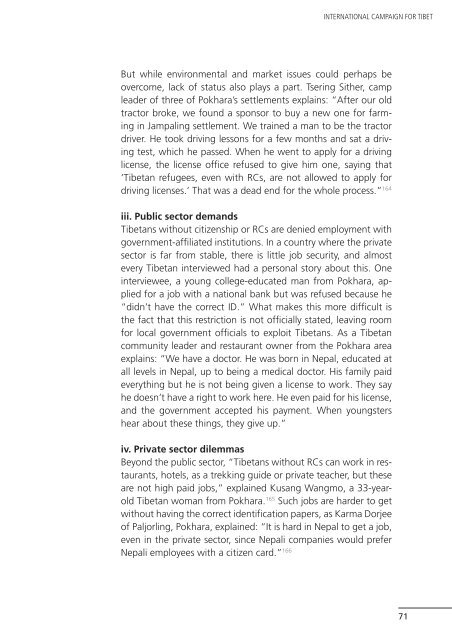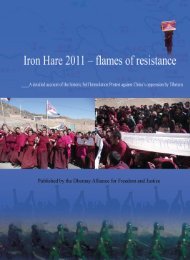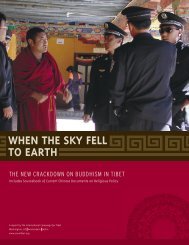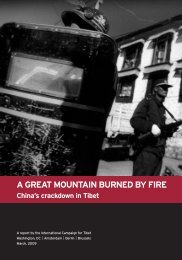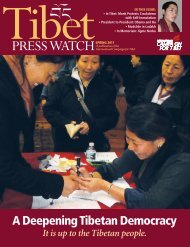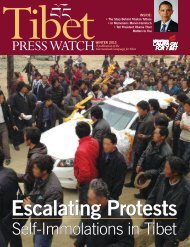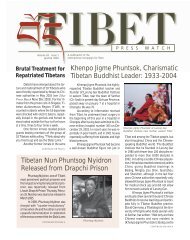DANGEROUS CROSSING: - International Campaign for Tibet
DANGEROUS CROSSING: - International Campaign for Tibet
DANGEROUS CROSSING: - International Campaign for Tibet
You also want an ePaper? Increase the reach of your titles
YUMPU automatically turns print PDFs into web optimized ePapers that Google loves.
INTERNATIONAL CAMPAIGN FOR TIBET<br />
But while environmental and market issues could perhaps be<br />
overcome, lack of status also plays a part. Tsering Sither, camp<br />
leader of three of Pokhara’s settlements explains: “After our old<br />
tractor broke, we found a sponsor to buy a new one <strong>for</strong> farming<br />
in Jampaling settlement. We trained a man to be the tractor<br />
driver. He took driving lessons <strong>for</strong> a few months and sat a driving<br />
test, which he passed. When he went to apply <strong>for</strong> a driving<br />
license, the license office refused to give him one, saying that<br />
‘<strong>Tibet</strong>an refugees, even with RCs, are not allowed to apply <strong>for</strong><br />
driving licenses.’ That was a dead end <strong>for</strong> the whole process.” 164<br />
iii. Public sector demands<br />
<strong>Tibet</strong>ans without citizenship or RCs are denied employment with<br />
government-affiliated institutions. In a country where the private<br />
sector is far from stable, there is little job security, and almost<br />
every <strong>Tibet</strong>an interviewed had a personal story about this. One<br />
interviewee, a young college-educated man from Pokhara, applied<br />
<strong>for</strong> a job with a national bank but was refused because he<br />
“didn’t have the correct ID.” What makes this more difficult is<br />
the fact that this restriction is not officially stated, leaving room<br />
<strong>for</strong> local government officials to exploit <strong>Tibet</strong>ans. As a <strong>Tibet</strong>an<br />
community leader and restaurant owner from the Pokhara area<br />
explains: “We have a doctor. He was born in Nepal, educated at<br />
all levels in Nepal, up to being a medical doctor. His family paid<br />
everything but he is not being given a license to work. They say<br />
he doesn’t have a right to work here. He even paid <strong>for</strong> his license,<br />
and the government accepted his payment. When youngsters<br />
hear about these things, they give up.”<br />
iv. Private sector dilemmas<br />
Beyond the public sector, “<strong>Tibet</strong>ans without RCs can work in restaurants,<br />
hotels, as a trekking guide or private teacher, but these<br />
are not high paid jobs,” explained Kusang Wangmo, a 33-yearold<br />
<strong>Tibet</strong>an woman from Pokhara. 165 Such jobs are harder to get<br />
without having the correct identification papers, as Karma Dorjee<br />
of Paljorling, Pokhara, explained: “It is hard in Nepal to get a job,<br />
even in the private sector, since Nepali companies would prefer<br />
Nepali employees with a citizen card.” 166<br />
71


